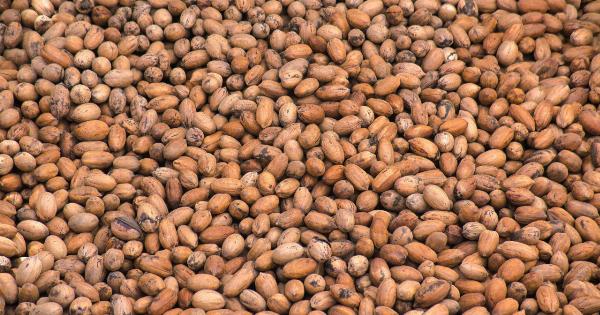If you and your partner are trying to have a baby, it’s important to be mindful of the foods you consume. Your diet plays a significant role in fertility, and certain foods can have a negative impact on your ability to conceive.
In this article, we will discuss 30 foods that you should avoid if you want to increase your chances of conceiving. Read on to find out more.
1. High-Mercury Fish
Fish that is high in mercury, such as shark, swordfish, king mackerel, and tilefish, should be avoided when trying to conceive. High levels of mercury can interfere with the production and maturation of eggs in women and sperm production in men.
2. Trans Fats
Foods that contain trans fats, such as processed snacks, baked goods, and fried foods, should be limited or avoided. Trans fats can increase insulin resistance, disrupt hormone balance, and negatively affect ovulation and sperm quality.
3. Alcohol
Alcohol consumption has been linked to decreased fertility in both men and women. It can disrupt hormone levels, impair egg and sperm development, and increase the risk of miscarriage. It is best to abstain from alcohol when trying to conceive.
4. Caffeine
While moderate caffeine intake is generally considered safe, excessive consumption may reduce fertility and increase the risk of miscarriage.
It is recommended to limit caffeine intake to 200 milligrams per day, which is equivalent to one cup of coffee.
5. Processed Meats
Processed meats like hot dogs, sausages, and deli meats should be avoided if you’re trying to conceive. These meats often contain high levels of nitrates, which can interfere with implantation and fetal development.
6. Soy Products
Soy products contain isoflavones, which are naturally occurring compounds that mimic estrogen in the body. High intake of soy products can disrupt hormone levels and affect reproductive functions.
It is best to consume soy in moderation when trying to conceive.
7. Sugary Foods and Beverages
High intake of sugary foods and beverages can lead to insulin resistance, weight gain, and hormonal imbalances, which can affect fertility. It is important to maintain a balanced diet and limit the consumption of sugary treats.
8. Artificial Sweeteners
Artificial sweeteners like aspartame and sucralose have been associated with decreased fertility. These sweeteners can disrupt hormone levels and negatively impact reproductive functions.
It is best to opt for natural sweeteners like honey or maple syrup instead.
9. High-Glycemic Index Foods
Foods with a high glycemic index, such as refined carbohydrates and sugary snacks, can cause spikes in blood sugar levels and insulin levels. This can lead to hormonal imbalances and interfere with ovulation and sperm production.
10. Non-Organic Produce
Conventionally grown fruits and vegetables often contain pesticide residues, which can disrupt hormone levels and affect fertility. It is best to opt for organic produce whenever possible to reduce your exposure to harmful chemicals.
11. High-Caffeine Beverages
Aside from coffee, other high-caffeine beverages like energy drinks and certain teas should also be consumed in moderation. Excessive caffeine intake can interfere with hormone levels and affect reproductive functions.
12. Raw or Undercooked Eggs
Raw or undercooked eggs may contain salmonella, which can cause food poisoning and increase the risk of miscarriage. It is important to cook eggs thoroughly before consuming them when trying to conceive.
13. High-Sodium Foods
High-sodium foods can cause water retention and increase blood pressure, which can negatively impact fertility. It is important to limit your intake of processed foods and opt for low-sodium alternatives.
14. Fast Food
Fast food often contains unhealthy trans fats, excessive sodium, and low nutritional value. Regular consumption of fast food can contribute to weight gain, insulin resistance, and hormonal imbalances, all of which can affect fertility.
15. Artificial Food Additives
Artificial food additives like artificial flavors, colors, and preservatives can disrupt hormonal balance and negatively affect reproductive functions. It is best to opt for whole, natural foods and avoid heavily processed options.
16. Red Meat
While lean cuts of red meat can be included in a balanced diet, excessive consumption of red meat has been linked to decreased sperm quality. It is important to consume red meat in moderation and opt for leaner cuts.
17. Low-Fat Dairy Products
Low-fat dairy products often contain added sugars and artificial ingredients. Studies have shown that high intake of low-fat dairy may negatively affect fertility in women. It is best to choose full-fat, organic dairy products when trying to conceive.
18. High-Sugar Breakfast Cereals
Many breakfast cereals marketed as healthy can be high in added sugars and artificial ingredients. Opt for whole-grain cereals with low sugar content to support fertility and overall health.
19. Excessive Salt
Excessive salt intake can disrupt the fluid balance in the body and affect blood pressure. It is important to limit your salt intake, especially if you have underlying health conditions that can affect fertility.
20. Margarine and Vegetable Oils
Margarine and vegetable oils often contain unhealthy trans fats and omega-6 fatty acids in excessive amounts. These fats can increase inflammation in the body and interfere with reproductive functions.
Opt for healthier fats like olive oil or avocado oil instead.
21. Highly Processed Snacks
Highly processed snacks, like chips, cookies, and crackers, often contain unhealthy trans fats, excessive salt, and artificial ingredients. These snacks provide empty calories and little nutritional value, which can negatively impact fertility.
22. High-Alcohol Beverages
Excessive alcohol consumption, including high-alcohol beverages like cocktails and spirits, can have a negative impact on both male and female fertility. It is best to limit your alcohol intake or abstain completely if you’re trying to conceive.
23. Canned Foods
Canned foods, particularly those with acidic ingredients, often contain bisphenol A (BPA). BPA is an endocrine disruptor that can interfere with hormone levels and reproductive functions. It is best to choose fresh or frozen foods instead.
24. Foods with Artificial Hormones
Foods that contain artificial hormones, such as some conventionally produced dairy or meat products, can disrupt your natural hormone balance. Opt for organic, hormone-free options whenever possible.
25. Excessive Protein Powder
Protein powders often contain artificial additives and excessive amounts of protein. Very high protein intake can affect hormone levels and reproductive functions.
It is best to consume protein from whole food sources rather than relying heavily on protein powders.
26. High-Cholesterol Foods
Foods high in cholesterol, such as fatty meats and full-fat dairy products, can negatively impact fertility and overall health. It is important to choose lean sources of protein and opt for low-fat dairy alternatives.
27. Unpasteurized Dairy Products
Unpasteurized dairy products, like raw milk and certain cheeses, can contain harmful bacteria and increase the risk of foodborne illnesses. It is best to choose pasteurized dairy products to ensure safety during pregnancy.
28. High-Oxalate Foods
High-oxalate foods, such as spinach, rhubarb, and beet greens, can increase the risk of kidney stones. While they can be part of a healthy diet, excessive intake of high-oxalate foods may interfere with nutrient absorption and reproductive health.
29. Non-Organic Meat and Poultry
Conventionally raised meat and poultry often contain antibiotics and hormones that can affect hormone levels and fertility. Opt for organic, grass-fed options to reduce your exposure to these substances.
30. High-Saturated Fat Foods
Foods high in saturated fats, like fatty cuts of meat and full-fat dairy products, can negatively impact fertility and increase the risk of various health conditions.
It is important to choose lean sources of protein and opt for low-fat dairy alternatives.



























